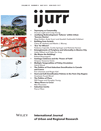Large-scale waterfront redevelopment projects, an urban development phenomenon that originated in the 1970s, are attractive to a growing suite of cities worldwide. But why? These mega-projects are full of pitfalls, broken promises, cost overruns, disappointments and are often accused of promoting inequality. In this article, we consider the specific case of Melbourne’s Docklands, which local popular opinion has roundly judged a failure despite the countervailing judgment of success in the revival of ‘liveability’ of the adjacent Melbourne central business district. We use the Docklands case to illustrate the utility of a ‘critical pragmatic’ framework of analysis to get behind dominant explanations of the demands of the urban growth machine and postmodern neoliberal capitalism. Without denying the existence of these dynamics, nor their hegemony, we nevertheless explicate how a critical pragmatic analysis can reveal the social dynamics driving the judgments and justifications offered by actors in urban redevelopment. A pragmatic analysis of these dynamics of argument and action at critical moments in the long process of an urban redevelopment can reveal new kinds of compromises and tests by which these projects are judged. In other words, what counts as failure and as success in the work of city building will shift, depending on what actors do and how they talk about it, and on how well these actions and justifications hold up to public challenges about the true character of a successful city. By gauging how these challenges are constituted and settled, we can better understand the evolution of the urban value proposition, and the new notion of justice grounded in urbanity that is emerging at the urban redevelopment frontier.
Articles
Details
Written by:
Meg Holden, Andy Scerri and Azadeh Hadizadeh Esfahani
Digital Object Identifier (DOI)
10.1111/1468-2427.12182
About DOI
Read full article as PDF
Read full article as HTML
See the references for this article

